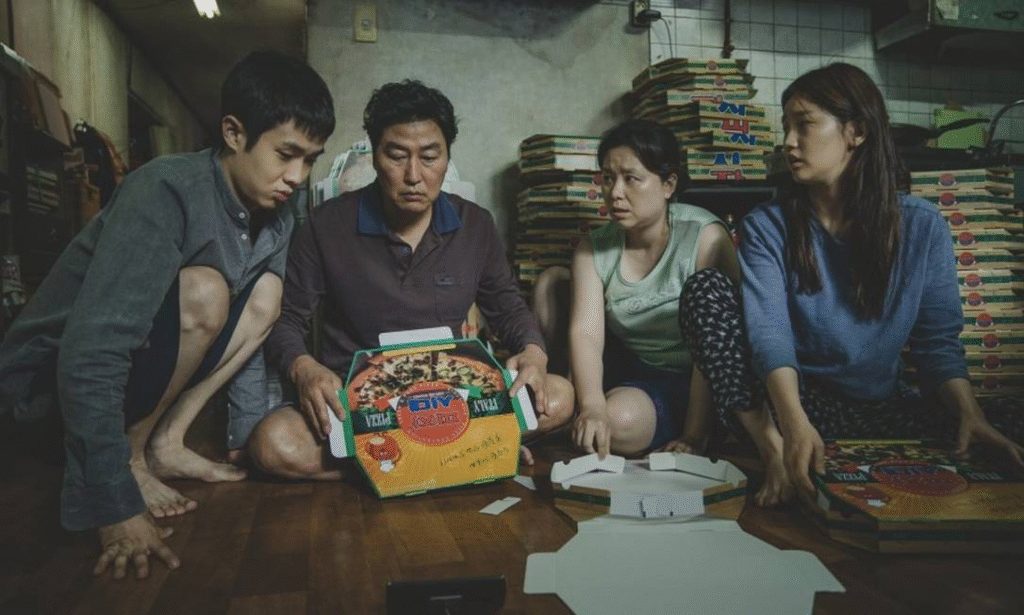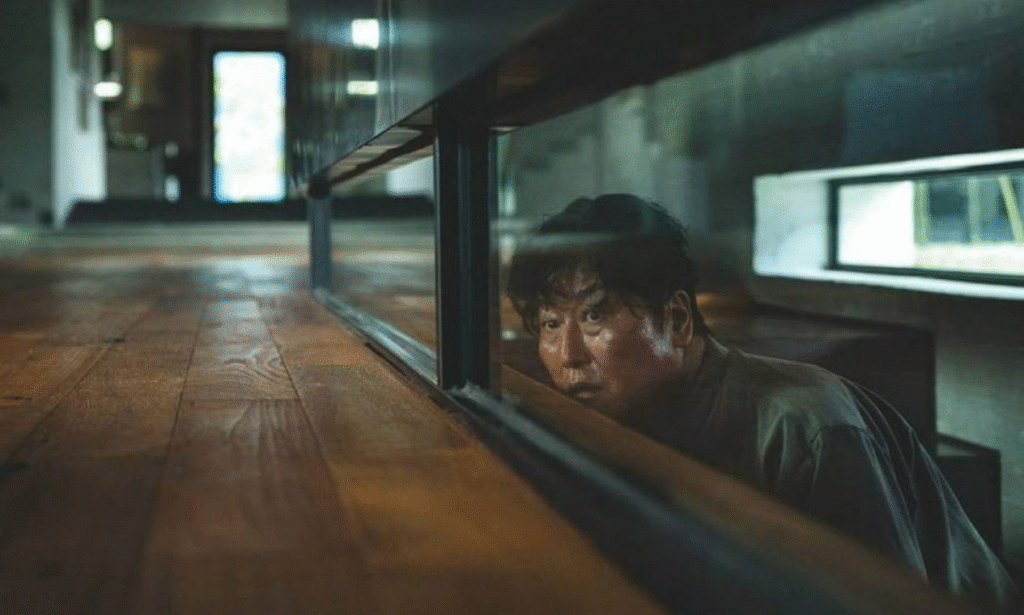The lasting success of Parasite continues to captivate audiences for reasons beyond awards and acclaim. Since its release, Bong Joon-ho's work has resonated across cultures with its fierce critique of inequality and sharp script. The film masterfully combines precise visual storytelling, dark humor, and dramatic tension.
Today, with the title available on Amazon Prime, access is even easier. This allows new viewers to discover it and fans to relive every detail. But why? Parasite still impresses so many people?
The sharp social critique that drives Parasite
From the first scenes, Parasite shows two families living on opposite ends of society: the wealthy Parks and the poor Kims. Rather than portraying this difference with clichés, Bong Joon-ho uses visual metaphors, such as stairs and natural light, to demonstrate inequality. The narrative evolves without exaggeration, but firmly, exposing how the system silently excludes.

The most fascinating thing is that the film doesn't label anyone as a villain. All the characters act according to their realities. This provokes deeper reflections, as the viewer sees themselves in parts of everyone. Parasite does not judge; he shows, suggests and provokes.
The suspense structure that keeps you hooked from beginning to end
The tension in Parasite It doesn't appear in an obvious or forced way. Bong Joon-ho builds each moment with surgical precision, gradually increasing the discomfort, almost imperceptibly. The skillfully structured script lulls the viewer into a false sense of predictability, only to reverse expectations in a surprising and impactful way.
What begins as a social satire with comedic touches quickly transforms into a dense and unpredictable psychological thriller. Just when everything seems to stabilize, a new layer of complexity emerges, revealing the depths of inequality, ambition, and tension between social classes. Every twist is purposefully constructed, and nothing is left to chance—Bong delivers a true study in visual and emotional storytelling that captivates the viewer until the very last second.
- Discover Apps to Watch Movies Online Whenever You Want
- Free Romance Movies? These Apps Will Melt Your Heart!
This becomes evident in the secret basement sequence. This unexpected and unsettling twist not only redefines the plot but also deepens the social conflicts at play. The tension comes not from explosions or chases, but from human choices, invisible pressures, and permanent imbalances.
Curious behind-the-scenes footage that reveals the genius of Parasite
Bong Joon-ho originally imagined Parasite as a play. However, realizing the plot's cinematic potential, he decided to turn it into a film. And he did so with impressive precision.
The Park family home, for example, doesn't exist in real life. The director and his team built the property on set, meticulously planning every detail. The environments reflect the characters' behavior: clean, organized, and at the same time cold and oppressive. The basement, on the other hand, represents the weight of social inequality, hidden, stifled, and ignored.

Humor and tragedy are balanced without exaggeration
Rare are the films that manage to balance humor and tragedy so naturally. In Parasite, the laughter arises from authentic, almost everyday moments. The Kim family reveals creativity, sarcasm, and charisma, which makes their actions understandable, even when questionable.
As the story progresses, the tone becomes darker. Humor gives way to unease, but without feeling abrupt. Everything happens organically. This smooth transition is one of the director's strongest traits. Laughter turns to nervousness, and nervousness turns to reflection.
The Oscar revolution and international projection
In 2020, Parasite made history by winning four Oscars, including the coveted Best Picture award—an unprecedented feat for a non-English-language production. Directed by Bong Joon-ho, the South Korean film surprised the world by breaking down linguistic and cultural barriers, proving that a good story is universal.
The Academy, in recognizing the talent of the Korean team, not only awarded a brilliant work, but also signaled a significant shift in how international cinema is valued. Parasite opened the doors for other narratives outside the Hollywood axis to gain space, attention and respect in the global industry, inspiring filmmakers around the world to tell their stories with authenticity and boldness.
- Watch Turkish Soap Operas for Free: 3 Must-Have Apps
- Scary Session Without Spending Anything: Apps to Watch Horror Online
This recognition created a domino effect. Producers, distributors, and platforms began investing more in international works. The success of Parasite not only changed the fate of his team, but also impacted the entire global film industry. He showed that local stories, told authentically, can reach the world.
The immersive experience of watching Parasite on Amazon Prime
Today, it is possible to watch Parasite on Amazon Prime with high-quality image and sound. The platform allows you to explore every detail of the film with clarity. The lighting, settings, and soundtrack take on new nuances when viewed closely.

Additionally, Amazon offers versions with subtitles and original audio, which preserves the actors' performances. Rewatch Parasite on the platform becomes a study of language, image, and behavior. Those who watch it more than once always discover something new.
Symbols and metaphors that enrich the narrative
Parasite doesn't explain everything directly. Instead, it relies on the audience's intelligence. Ordinary objects, like the stone given to young Kim, the ramdon prepared by his mother, or the rain that devastates the poor family's home, carry powerful meanings.
Rain, for example, symbolizes purification for the rich, who take advantage of the time to relax. For the poor, however, it represents destruction. This contrast defines the film. Bong Joon-ho uses everyday life as a mirror of inequality. And he does so masterfully.
The ambiguous morality that provokes discussions
Another aspect that impresses in Parasite is the morality of the characters. None of them is purely good or evil. They all act motivated by fear, ambition, or desperation. This generates empathy and discomfort at the same time.
The Kim family isn't typical criminal. They do what they have to to survive, even if it involves lies. The Park family, on the other hand, isn't intentionally cruel. However, their lack of empathy reveals how privilege can blind.
Parasite's legacy remains strong
Even years after its release, Parasite remains relevant. It influences productions, inspires debates, and appears in classes, articles, and discussion groups. Its strength comes from the balance between entertainment and social criticism.
Many films attempt to replicate the formula, but few achieve the same depth. Bong Joon-ho's secret perhaps lies in his courage to say a lot with little, to provoke without preaching, and to move without manipulating.
Conclusion
Parasite still impresses because it's more than a film—it's an experience. It stirs emotions, questions certainties, and delivers a cinematic masterclass. Available on Amazon Prime, it remains accessible to anyone who wants to immerse themselves in a rich, provocative, and extremely timely story.

With a bold script, impeccable direction and memorable performances, Parasite remains one of the great works of our time. And no matter how many times you see it, there will always be something new to discover—because a good film is watched, but a great film is revisited.

Don't have this streaming service? Then click the button below and find out how to watch your favorite movies and series for free!
